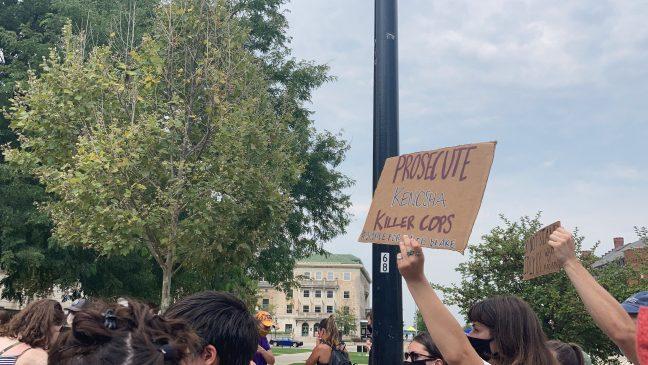There is little question that America is facing a decisive moment in history.
For the past two months, BLM protesters have marched the streets of Wisconsin, calling for criminal justice reform. There has been a local response to the protests as the Madison school board opts out of their contract with the police. Statewide action, however, has been woefully lacking.
Rep. LaKeshia Myers, D-Milwaukee, sent a letter to Gov. Tony Evers in early June, asking him to call a special session of the Legislature with respect to the protests. Evers has not responded to her request. Lt. Gov. Mandela Barnes has stated this is due to Evers’ fear that the Republican-controlled Legislature will initiate a series of sessions that will eventually result in no action being taken in reforming Wisconsin police.
Ending prison gerrymandering is first step, but we must also give voices to incarcerated
It is a legitimate fear to say the least, as Republicans successfully bypassed Evers’ past special session on gun control last year just by convening and immediately adjourning the special session without any debate. Right now, it seems as though Evers is doing the smart thing by not responding to Myers’ request — delayed action does seem better than no action being taken at all.
The problem with this boils down to one question — how much of a time delay can we afford?
Last Sunday a video went viral showcasing the tasing and subsequent shooting of unarmed 29-year-old Jacob Blake, a Black man residing in Kenosha. He had been shot in the back seven times by Officer Rusten Sheskey, a seven-year veteran of the Kenosha Police Department, according to the Wisconsin Attorney General Josh Kaul in the statement and at a press conference in Kenosha.
This gross act of racial injustice has incited massive protests and rioting all over Wisconsin and the entire country. Along with it came additional tragedy, when 17-year-old Kyle Rittenhouse shot three, killing two, protesters. Evers responded to this by announcing an increased presence of the National Guard in Kenosha, totaling over 500 troops.
Recording of Evers, Republican lawmakers raises ethical questions beyond one-party consent
As the situation surrounding Blake’s death continues to escalate each day, it raises additional scrutiny as the state involvement comes to a grinding halt. As the city continues to propose short term solutions, it is up to the state to permanently change the state of police in Wisconsin. We don’t need curfews, we need legislative bills guaranteeing increased accountability from the police and the state itself. Most importantly, we need it now.
Republican Assembly Speaker Robin Vos, R-Rochester, has expressed reluctance over calling a session over police reform, saying there’s no reason to “rush” into a legislative session.
“Sometimes politics is slow, but it also is deliberate and that’s how we get things right,” Vos said in a statement.
Suffice to say, there are several things wrong with Vos’ sentiment. There is a reason to rush into a session. As police remain largely unaccountable for their actions, lives are at stake. How many more people need to be injured, even dead, before lawmakers realize Wisconsin’s well-documented history of police brutality against Black people must be addressed?
The Badger Herald Editorial Board: On elevating Black stories through ethical journalism
For Evers and the rest of the Republican Legislative, silence is no longer an option. Refusal to hold special sessions regarding the BLM movement as protests continue to heat up — to the point of arsons occurring during the riots — will worsen the situation, perhaps even resulting in additional victims.
Increased accountability from the police has been long since coming. It is downright criminal as Republicans block bills supporting police reform and ultimately render special sessions useless with inane political gambits.
As protesters’ voices continue to be ignored on the state-level, there will continue to be more Jacob Blacks, George Floyds and Breyonna Taylors. Police reform must be supported bipartisanly and with concrete bills to establish equity within the criminal justice system.
Samiha Bhushan ([email protected]) is a sophomore majoring in English literature.


